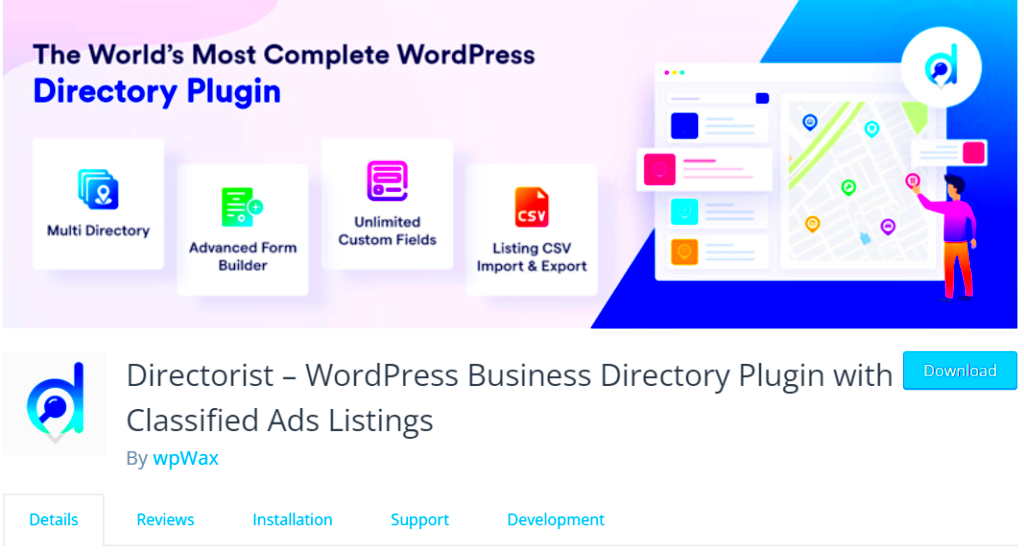When it comes to running a successful website, having the right tools can make all the difference. Business directory and blog plugins for WordPress are essential for anyone looking to highlight local businesses or create engaging content. They help you manage listings, improve SEO, and foster community engagement. With so many options available, finding the best plugin can be overwhelming. However, understanding what these plugins do and how they can benefit your site is the first step towards enhancing your online presence.
Key Features to Look for in a Business Directory/Blog Plugin

Choosing the right business directory or blog plugin can significantly affect your website’s functionality and user experience. Here are some essential features you should look for:
- User-Friendly Interface: A clean, intuitive dashboard makes it easier for website owners and users to navigate the plugin.
- Customizable Listings: Look for plugins that allow you to create and modify detailed listings, including images, descriptions, and categories.
- SEO Optimization: Ensure the plugin supports SEO best practices, like customizable URLs and meta tags, to boost your visibility on search engines.
- Search and Filter Options: Advanced search functionalities enhance user experience by allowing visitors to quickly find what they’re looking for.
- Integration with Other Plugins: Compatibility with popular plugins for email marketing, social media, or payment gateways can offer added functionality.
- Responsive Design: A plugin that is mobile-friendly ensures your directory looks good on all devices, catering to more users.
- Review and Rating System: User-generated reviews can build trust and credibility, enhancing the value of your business directory.
- Multi-Language Support: If you’re targeting an international audience, consider plugins that offer translations for various languages.
- Regular Updates and Support: A plugin that is frequently updated and comes with reliable customer support is crucial for a smooth experience.
By keeping these features in mind, you’ll be well on your way to finding the perfect business directory or blog plugin that meets your needs and helps your website thrive.
Top Business Directory Plugins for WordPress
When it comes to presenting a comprehensive list of businesses, a robust business directory plugin is essential for WordPress websites. The right plugin can make it easy for visitors to find information and can transform how you manage and showcase business listings. Here are some of the top business directory plugins you might want to consider:
- Business Directory Plugin: This plugin is User-friendly and offers extensive features. It allows you to create a fully functional directory, complete with categories, listings, and payment options for featured listings. Installation is simple, and customization is a breeze.
- GeoDirectory: If you want to go beyond a traditional business directory, GeoDirectory could be your go-to option. It’s a powerful and scalable solution that allows you to create a global business directory. The geolocation features make it easy for users to find listings near them.
- Directory Pro: This premium plugin is known for its stunning design and features. It offers a range of customization options, so you can create a directory that matches your unique brand. With built-in support for Google Maps and review features, it’s a complete package.
- Sabai Directory: If you’re looking for a more visually appealing layout, Sabai Directory provides a modern interface combined with essential features. It allows users to submit business listings and provides advanced filtering options for enhanced searchability.
- WP Business Directory: This plugin is tailored for simplicity and effectiveness. It’s lightweight and offers basic yet essential directory features like search filters, categories, and customizable fields.
Choosing the right business directory plugin depends on your specific needs and goals. Make sure to consider factors like ease of use, design, and the functionalities that are most important for you.
Best Blogging Plugins for WordPress
Blogging is an art and a science, and the right plugins can make your life as a blogger much easier and more productive. Here are some of the best blogging plugins for WordPress that can help you elevate your content and streamline your processes:
- Yoast SEO: Arguably the most popular SEO plugin, Yoast SEO helps you optimize your content for search engines. With features like readability analysis and keyword optimization, it’s a must-have for any serious blogger.
- Akismet: Protecting your blog from spam comments is crucial for maintaining quality and engagement. Akismet automatically filters out spammy comments, allowing you to focus on genuine interactions with your audience.
- WPForms: If you’re looking to engage with your readers through forms, WPForms is incredibly easy to use. It allows you to create contact forms, surveys, and subscription forms with a simple drag-and-drop builder.
- Jetpack: This multifunctional plugin offers a suite of features including website security, speed optimization, and even analytics. It’s like a Swiss Army Knife for bloggers, providing various tools to enhance your site.
- UpdraftPlus: Regular backups are essential to safeguarding your content. UpdraftPlus makes it easy to schedule backups and store them on cloud services like Google Drive or Dropbox, ensuring your hard work is never lost.
The right collection of blogging plugins can make all the difference in your content creation journey. From SEO optimization to user engagement, these plugins are designed to help you succeed.
5. Comparative Analysis: Business Directory vs. Blogging Plugins
When it comes to enhancing your WordPress site, understanding the differences between business directory plugins and blogging plugins is crucial. Each type of plugin serves distinct purposes, and choosing between them depends on your specific goals.
Business Directory Plugins are designed to help businesses and professionals list their services, contact information, and other relevant details. They often come with features like:
- Search Functionality: Customers can easily search for businesses based on location, category, or keywords.
- Listing Management: Owners can create, manage, and update their listings easily.
- Reviews & Ratings: Users can leave feedback, helping to build trust and community engagement.
- Monetization Options: Many plugins allow you to charge businesses for premium listings or advertising space.
Conversely, Blogging Plugins focus more on content creation and engagement. They enable you to produce articles, share insights, and foster discussions. Here’s a sneak peek at some of their features:
- SEO Optimization: Tools to help your blog posts rank better in search engines.
- Social Sharing: Easy integration with social media platforms to expand your audience.
- Comment Management: Encourage dialogue and interaction with readers.
- Content Scheduling: Plan and publish posts at optimal times to reach your audience effectively.
In summary, if your goal is to create a robust listing platform for businesses, a business directory plugin is your best bet. However, if you’re more focused on content and conversation, a blogging plugin is the way to go. Understanding these differences will help you make an informed choice that aligns with your site’s objectives.
6. How to Choose the Right Plugin for Your Needs
Selecting the right plugin is like finding the perfect outfit—it needs to fit your needs and complement your website’s style! Here are some essential points to consider that will guide you in making the best choice:
1. Identify Your Primary Goal: Think about what you want to achieve with your site. Are you looking to connect businesses with customers, or is your primary focus on sharing valuable content? This fundamental question will steer you toward the right plugin type.
2. Check Compatibility: Ensure that the plugin you choose is compatible with your existing WordPress theme and other plugins. Not all plugins play nicely together, and compatibility is essential for smooth functionality.
3. Review Features: Different plugins offer various features. Make a list of must-have features, such as:
| Feature | Business Directory Plugin | Blogging Plugin |
|---|---|---|
| SEO Tools | Basic | Advanced |
| User Reviews | Yes | No |
| Custom Post Types | Yes | Limited |
| Social Sharing | No | Yes |
4. Read Reviews and Testimonials: User experiences speak volumes! Take time to read reviews from other users to gauge reliability, ease of use, and overall satisfaction with the plugin.
5. Pricing and Support: Evaluate your budget. Some plugins are free with limited features, while others require a monthly or annual subscription. Don’t forget to check what kind of support is offered—good customer service can save you a ton of headaches down the road.
In conclusion, consider these factors carefully, and you’ll be well-equipped to choose the right plugin that will empower your WordPress site. Happy plugin hunting!
7. Step-by-Step Guide to Installing and Configuring Your Plugin
Getting started with a business directory or blog plugin for your WordPress site may seem daunting, but it doesn’t have to be! Here’s a straightforward guide to help you install and configure your chosen plugin quickly and efficiently.
- Log into Your WordPress Dashboard: Head over to your website’s admin panel. You can usually get there by going to
yourwebsite.com/wp-admin. - Navigate to Plugins: On the left-hand sidebar, find the “Plugins” option and click on “Add New”. This will take you to the plugin marketplace.
- Search for Your Plugin: In the search bar, type the name of the directory or blog plugin you wish to install, such as “Business Directory Plugin” or “WP Business Directory”.
- Install the Plugin: Once you find the desired plugin, click the “Install Now” button. After it’s installed, the button will change to “Activate”. Click it to activate your plugin.
- Configure Settings: After activation, you’ll typically see a new menu item for your plugin in the dashboard. Click on it to access the settings. Take your time to customize aspects such as layout, categories, and user submission forms to fit your needs.
- Add Listings or Blog Posts: Explore how to create new listings or posts. Depending on the plugin, you might have options like “Add New Listing” or “Write a Post”. Fill in the necessary details and hit publish!
- Test Everything: Make sure to visit your website to see how the directory or blog looks. Test various features to ensure everything is functioning as expected.
And just like that, you’re set up and ready to launch! Don’t forget to regularly check for plugin updates to keep everything running smoothly.
8. Best Practices for Using Business Directory and Blog Plugins
To get the most out of your business directory and blog plugins, it’s crucial to follow some best practices. These tips not only enhance user experience but also improve your site’s performance.
- Regularly Update Your Plugin: Keeping your plugin updated ensures you have the latest features and security patches. Check for updates periodically directly from your WordPress dashboard.
- Optimize for SEO: Use SEO-friendly features provided by the plugin. Include meta descriptions, alt text for images, and relevant keywords in your listings and blog posts to enhance visibility on search engines.
- Encourage User Interaction: Allow users to leave reviews, comments, or ratings. This fosters community engagement and adds valuable content to your directory or blog.
- Organize Listings Effectively: Use categories and tags thoughtfully. A well-organized directory makes it easier for users to find what they’re looking for and improves navigation.
- Monitor Performance: Use analytics tools to monitor how users interact with your directory or blog. This can be invaluable for identifying areas that need improvement.
- Responsive Design: Ensure that your plugin is responsive, meaning it looks great on all devices. With more users accessing websites through mobile devices, this is key to user satisfaction.
- Test for User Experience: Regularly test the user experience by navigating your directory or blog as if you were a visitor. This helps pinpoint any hiccups that could frustrate your users.
By adhering to these best practices, you can create a robust business directory or blog that serves your audience effectively, keeping them coming back for more!
Case Studies: Success Stories Using These Plugins
When it comes to choosing the right business directory or blog plugin for your WordPress site, success stories can provide valuable insights. Here are a few case studies that highlight how businesses have thrived using the best plugins available:
1. Local Business Directory Plugin: The Power of Community
Take, for instance, a small-town coffee shop that decided to leverage the Business Directory Plugin. By creating a directory of local businesses, the owner not only increased visibility for their own café, but also fostered a sense of community among local enterprises. Over six months, foot traffic increased by 30%, and they reported higher engagement on social media as customers were eager to support local initiatives.
2. GeoDirectory: Finding Local Services Made Easy
Another example comes from a real estate agency that implemented the GeoDirectory plugin. With this versatile tool, they created a detailed directory that allowed users to not just find properties, but also view local service providers like electricians and plumbers. Within three months of launch, they reported a 50% increase in website traffic and a significant uptick in leads, proving that a well-structured directory can attract target audiences effectively.
3. WP Business Directory: Streamlining Information
A nonprofit organization used the WP Business Directory plugin to create a comprehensive list of their initiatives and partners. This transparency led to increased donations, with a 40% rise in contributions after they published an easily navigable directory of how funds are allocated. Clients appreciated the simplicity of accessing information, which built trust in the organization.
These case studies showcase that with the right tools, businesses can not only improve their online presence but also significantly boost engagement and revenue.
Conclusion: Making the Right Choice for Your Business
Deciding on the best business directory or blog plugin for your WordPress site can feel overwhelming, but it’s an essential step towards building an effective online presence. Here are some key takeaways to ensure you make the right choice for your business:
- Identify Your Needs: What do you want to achieve? Whether it’s increasing local visibility, generating leads, or streamlining information, knowing your goals is crucial.
- Evaluate Features: Look for essential features such as SEO optimization, user-friendly interfaces, and customization options. A plugin with robust features can adapt to your evolving business needs.
- Check Compatibility: Make sure the plugin is compatible with your theme and other plugins. This will save you from potential conflicts and ensure a smooth experience.
- Select Based on Reviews: User feedback is invaluable. Check ratings and reviews to understand real-world performance and reliability before making your choice.
- Consider Scalability: Choose a plugin that can grow with your business. You don’t want to outgrow your plugin in a few months.
In conclusion, investing the time to research and analyze your options will pay off in the long run. By selecting the right business directory or blog plugin, you can effectively showcase your offerings, engage your target audience, and ultimately drive success for your business. Happy plugin hunting!



